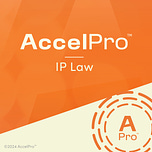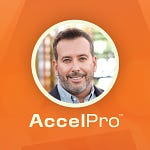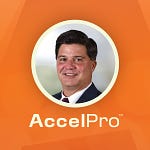Listen on Apple Podcasts and Spotify.
Welcome to AccelPro IP Law, where we provide expert interviews and coaching to accelerate your professional development. Today we’re talking with George Mason’s Sandra Aistars.
Generative artificial intelligence is continuing to transform business, entertainment and digital life. Questions of ownership around AI-generated output and training AI using copyrighted data continue to keep experts busy around the world. The rise of generative artificial intelligence tools is leading to new copyright and IP questions for creators, rights-holders and judges alike.
Aistars is a Clinical Professor at George Mason University Antonin Scalia Law School and leads the law school’s Arts & Entertainment Program. She is also Senior Fellow for Copyright Research and Policy and a Senior Scholar at the Center for Intellectual Property x Innovation Policy.
In this conversation, we discuss generative artificial intelligence output and training, as well as the intellectual property and copyright issues surrounding it. The episode transcript and supplemental materials are available below.
Listen on Apple Podcasts and Spotify.
Interview References:
Sandra Aistars’ George Mason University Antonin Scalia Law School profile.
6:07 | US Patent and Trademark Office (USPTO). (2023).
8:10 | GENERAL GUIDE TO THE COPYRIGHT ACT OF 1976. (1977).
12:25 | Copyright, Designs and Patents Act. (1988).
Supplemental Materials:
Asmelash, Leah. (October 8, 2023). These books are being used to train AI. No one told the authors. CNN Style.
Walsh, Dylan. (August 28, 2023). The legal issues presented by generative AI. MIT Sloan Management Review.
TRANSCRIPT
I. WHO OWNS AI OUTPUT?
Neal Ungerleider, Host: Can you tell our listeners a little bit about you and your background?
Sandra Aistars: Absolutely. I am a clinical professor at George Mason, as you mentioned, and I run an arts and entertainment clinic there. I work with students representing artists and small businesses in the arts and with copyright issues that come up in their day-to-day practice. I also teach classes in professional responsibility and entertainment law. As you might imagine, artificial intelligence is a big deal in my world these days.
NU: I know you've been doing a lot of research on the topic of AI and copyright. I think a good starting point would be, what exactly is generative artificial intelligence from your perspective?
SA: That is a good place to start. One thing that I'm doing in a paper that I'm presenting is that I actually asked the generative AI to define generative AI for me. It told me that generative AI is a system for generating new data that is similar to existing data that it was trained on.
The way that works is that neural networks analyze patterns and relationships in the data that the AI has been trained on, and then they generate new data based on those patterns. And so, generative AI can be used to do a variety of different things. You can use it to generate images, to generate text, to compose music, and even do things like create video games. This is the definition that ChatGPT gave me.
I might pick a couple of different words and I might not use “data” in some of these definitions because this data is not something that's protectable by copyright law. Only the creative selection and arrangement and compilation of the data is protectable, but I'm not going to quibble here with the definition too much.
One other thing that's worth mentioning is that one of the most popular ways that generative AI’s work is by involving two different neural networks working together, which is referred to as generative adversarial networks. What happens there is that the first network is the generator, and creates the images, the texts, or the music—whatever the task the AI has been asked to do. Then the second neural network is the discriminator neural network; the second one evaluates and gives feedback to the first in order to improve its output.
The point, at least according to ChatGPT, is for the generator to learn to create new data that is increasingly similar to the original data. We can come back to what that means for concepts like originality under copyright law as we go on in our conversation, but that's how it works.
NU: From a copyright perspective, are there differences in works that are created with the assistance of generative AI or works that are created entirely by generative AI with no human providing inputs?
SA: For sure. The place to start is with the requirements for originality under copyright law, and I will back up a little bit further and talk about how one goes about registering a work. The US doesn't require formal registration of works, but a gating question for most of us when we're talking about AI and authorship, or AI and infringement, will be whether one can register a work, and if so, who can do that. That's because the status of works created by AI is in question, and it's likely to be in question for quite some time.
The reason you would want to register a work is because you need a registration certificate in order to enforce your rights in federal court. And even if you're not going to enforce your rights in federal courts, maybe you want to take advantage of this new system before the Copyright Office to enforce your rights. In this new small claims process, you at least have to file an application to register work.
In the US, the Copyright Office is the responsible entity for registering works, and it doesn't have a very extensive process of examining works, not like you would if you were perhaps registering a trademark or a patent with the USPTO. But it does have a registration process. It consists of a review by the copyright registration specialists to determine compliance with its requirements, and then they issue a registration certificate if you've met all the requirements.
If they deny you a registration, you have got the opportunity to appeal. And if you are still denied the registration certificate, you have a further opportunity to appeal to a three-person internal review board within the Copyright Office. The Copyright Office can also cancel a registration if they find that there's been fraud, or if they believe that they need further information to evaluate an application. They can go out and do a little bit of their own research to evaluate what's going on and take note of that for their review process.
That’s a very long-winded way to go about answering the question that you asked me, but I'm mentioning all of this because all of these issues have recently come into play in reviews of registration applications concerning works involving AIs. For example, I was dealing with a work that was wholly created by AI and I had another work that was created by a human artist using an AI as a tool, and those two were dealt with quite differently by the Copyright Office.
The first thing that's important to know is that the Copyright Office's role is to apply the law as it exists, not to expand it. That said, copyright law is supposed to be technologically neutral. If the law can be applied to a new technology, they should apply it. But under the Copyright Act of 1976, which is our current Copyright Act, the Copyright Office takes the position that you require human authorship in order to register a work.
And so, the fully AI-created work is not registrable at all. The one that is partially created by a human and partially created by an AI is registrable, but you need to examine the degree to which the human controls the process in order to determine that it is indeed copyrightable by the human. I can go into the case law and so forth if you're interested in more background on all of that because the Copyright Office just came out with guidance for people on what they look at based on these two registration procedures they just went through.
—
II. TRAINING AI ON COPYRIGHTABLE DATA
NU: I have a question about training data, which you mentioned earlier. What are some of the big copyright issues around all the training data that's used for these AI tools?
SA: Training data has been incredibly controversial, partially because the data itself that most of these AI tools are trained on is copyrightable data. They're copyrighted works created by artists, and it's not clear that the companies using these works to train the systems have permission from the artists to use them. In fact, there are numerous lawsuits asserting that artists have not given permission and that the services have scraped internet websites or otherwise obtained access to their works to train AI tools without compensation and without permission.
This scraping process, or the obtaining of these databases of artworks, literary works, or musical works, requires the making of at least one, and probably more, infringing copies of works to compile and facilitate the ingestion of data into the AI tool. Then the tool uses that data as a means of training itself to do the various tasks that it's then asked to do.
The AI companies argue that the ingested data doesn't leave the tool, and that the tool is not even really using works in a meaningful way. If anything, they argue the tools are using the works to make various assessments about the works or measurements or calculations about the works, and they're only using data about the works and not the works themselves to create those outputs, and that they could just as well throw away all those data sets. But artists contend that those assertions are false.
First of all, they point to evidence that the appearance of substantial portions of their works, even their actual signatures or watermarks, are being output by the tools. And they claim that, at minimum, this suggests that the tools have access to their works and are copying or emulating what the AI perceives to be meaningful portions of their works. And they assert that they're losing commissions to AIs that are trained to compete with them. They generate works that look like theirs and do not just create works that are created to be original works of authorship, like an artist in competition with them out in a normal artistic marketplace.
I was participating in some listening sessions at the Copyright Office about some of these issues. People were raising a variety of concerns, including the need to understand this full life cycle of the materials that are being used, the source of the materials, and whether they’re being sourced with the consent and the understanding of the artists as to how they would be used.
Artists were noting that you really can’t equate the way that these AI tools use works with human learning. Artists don’t look at a volume of images like AI tools can and then generate output the way that AI tools do. Artists create by taking in other things in life, other experiences, and employing their own technical artistry. It’s really difficult and not part of artistic practice to try and actually mimic another artist’s style or approach. If you do it, it’s actually considered forgery. And you get in trouble for that as an artist, so you don’t go in and sell those services in the marketplace to other people. Analogizing how humans create in this space is really a bad idea.
[If you’d like to read this transcript on the web, click here.]
—
III. TRANSITIONING TO ACADEMIA
NU: I want to shift gears and ask you a little bit about your career. I'm curious what first attracted you to copyright law?
SA: I fell into practicing copyright law. I was working at a large law firm, Weil, Gotshal & Manges, when I started out in my career and sort of naturally fell into it as a practice area.
I did a bunch of projects with a partner I really enjoyed working with, and the Digital Millennium Copyright Act was being passed at this time. I had the opportunity to work on aspects of that legislation, and then also on some licensing work that dealt with standards being set for the development of DVD technology and various content protection and digital rights management technologies relating to that area.
NU: What were the most unexpected things on your journey?
SA: I've had all sorts of interesting experiences and opportunities. Even coming to academia–-I would never have expected to take a turn to work in academia at that stage in my career.
I made the switch to academia because I really loved the pro bono work that I was doing, and I enjoyed working with individuals and small businesses so much and saw the opportunity to combine that with working with students and helping them launch their careers.
It just seemed like the perfect fit in a way to bring everything that I'd done full circle. I guess that might be a very unexpected turn. To go from starting my career and working on high tech issues and representing big companies, to working on high-tech issues at this stage of my career and working with individuals and small businesses.
NU: What advice do you have for others who are making the transition to academia?
SA: While it depends on what point in their career they're doing it, I think typically people enter academia with a very defined path, and fairly early on in their practice careers. If they practice law at all, they do so for a couple of years. Find a great mentor within academia to help guide your progress, write a few strong articles before you make the transition, and have a passion for learning and teaching.
You can now listen on Apple Podcasts and Spotify.
This AccelPro audio transcript has been edited and organized for clarity. This interview was recorded on May 5, 2023.
AccelPro’s interviews and products accelerate your professional development. Our mission is to improve your day-to-day job performance and make your career goals achievable.
Please send your comments and career questions to questions@joinaccelpro.com. You can also call us at 614-642-2235.
If your colleagues in any sector of the IP law field might be interested, please let them know about AccelPro. As our community grows, it grows more useful for its members.












